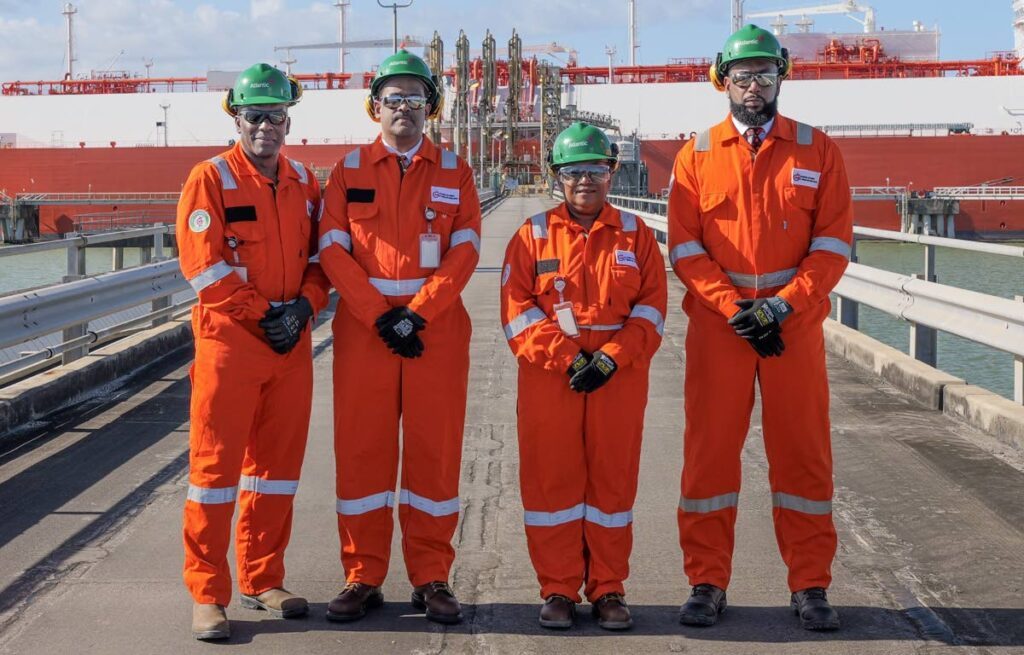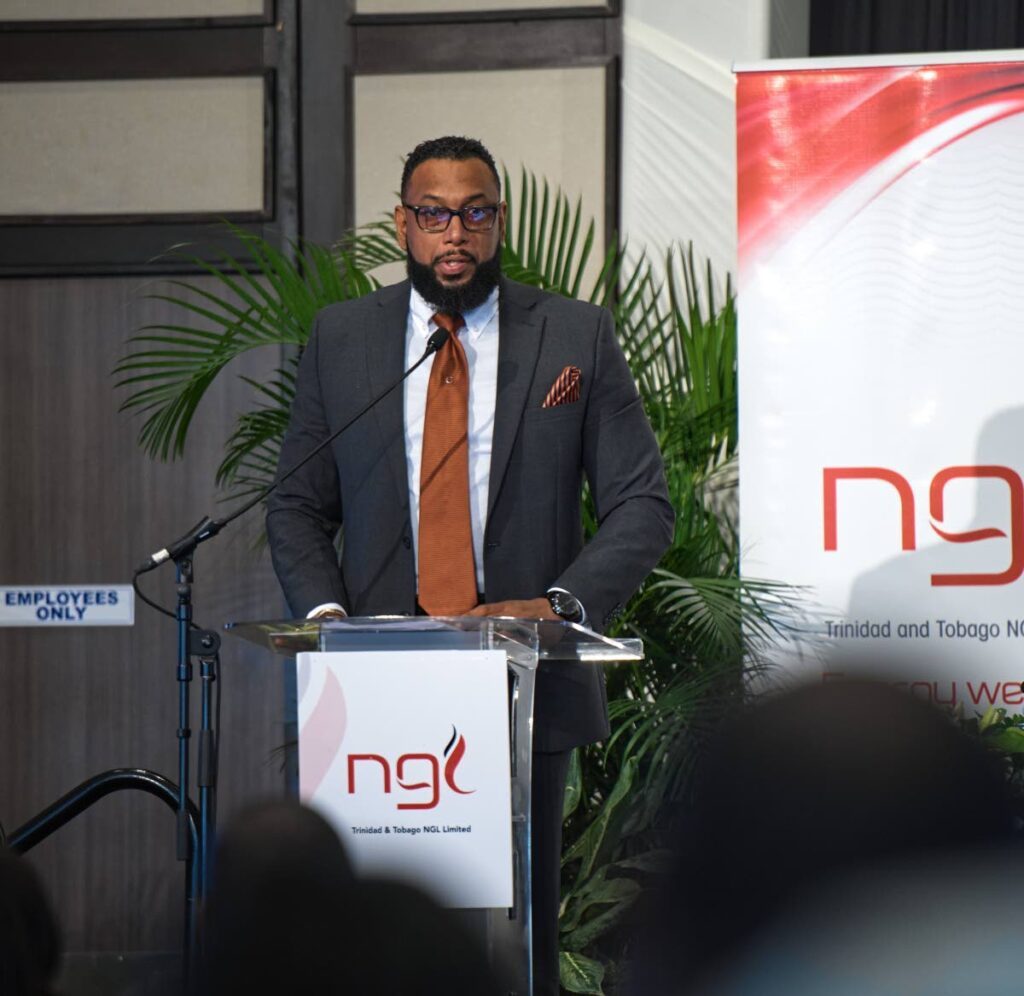NGC bounces back in 2024 - chairman optimistic after declaring losses in 2023

PHOENIX PARK Gas Processors Ltd (PPGPL), a company which was bought at billions of dollars above its fair value price, is now, a little more than ten years later, recorded to have lost more than a billion dollars in value.
The depreciation is contributing to challenges for its parent company, NGC, whose executive team, in a closed-door session with reporters at the Brix Hotel on December 12, admitted it was part of the reason it saw losses in 2023.
But, Narinejit Pariag, vice-president of finance; president Edmund Subryan; chairman Dr Joseph Ishmael Khan and vice president of commercial, Verlier Quan-Vie, assured that the valuation of the company is not a reflection of the performance of PPGPL, but rather, a snapshot of its overall value given the current global circumstances.
What happened to PPGPL?
PPGPL is a TT-based gas processing company formed in 1989. The company is split into three major parts, NGC NGL, which owns 51 per cent, TT NGL, which owns 39 per cent and Pan West Engineers and Constructors LLC, which has a ten-per-cent share.
In 2020, the company acquired the marketing assets of Twin Eagle Liquids Marketing LLC, a Texas company that markets, trades and transports natural gas to Canada, the US and Mexico.
In 2013, NGC acquired PPGPL at a goodwill of $2.3 billion. What this means is, NGC bought its 39-per-cent share from ConoccoPhilips at $2.3 billion more than its fair price, according to accounting standards.
The acquisition meant that NGC would have an overall 90-per-cent stake in the gas processing company.
Pariag explained, goodwill is the premium a company pays for assets based on a forecast of its value. It is calculated by the purchase price of a company and subtracting it from the fair value of its assets and liabilities.
“So if there is a company that is valued at $5 million and you acquire it for $7 million that excess is deemed goodwill. There has to be something in that organisation that would interest a company that would make it pay a higher price.”
Quan-Vie added, “When you are doing business, you look at an asset and you look at what you think in terms of that outlook for the utilisation of that asset. So in terms of purchasing the asset the company would have made assumptions around the pricing, the richness of the gas, the quantity of gas and quite a number of other factors in determining what is the purchase price for the asset.”
Goodwill is tested for impairment, a depreciation in the value comparable to the price at which it was bought, on an annual basis. In 2023 the assessment, which took into accounts cash flows that are supportable, resulted in a $1.5 billion diminishing in the value of goodwill for PPGPL.
The valuation of PPGPL for the impairment test was based on production, price and values of the goodwill.

Another impairment cost came from Caribbean Gas Chemicals, a company in which NGC has a 20 per cent stake.
Pariag explained that according to International Financial Reporting Standards standards when a company owns 20-50 per cent off a company but it doesn’t exercise control, accountants use the equity method.
“If you hold 20 per cent in the organisation, and it records a million profit, you get 20 per cent of that million dollars and you can put it in your books,” he said.
However, Caribbean Gas Chemicals also met impairment charges, meaning NGC had to bear 20 per cent of those charges in their accounts.
"The valuation could be reversed as conditions in the global oil and gas sector changes," Pariag said.
NGC rebounds to $544 m in profits in 2024
Impairment costs were part of the reason NGC went from a $2.4 billion gross profit in its core business to a $1.3 billion loss after tax in 2023.
The NGC consolidated statement of profit and loss for the year ending December 31, 2023 recorded a profit before goodwill charges and share of associates at $1.8 billion. The $1.5 billion charge for PPGPL plus the share of losses from Caribbean Gas Chemicals reduced the profit before tax to $24.2 million. Taxes that amounted to $1.3 billion
Pariag added that while the company benefited from high LNG prices in 2021 and 2022 prices plummeted in 2023.
According to online statistics portal statista, in December 2022, LNG was priced at around US$30.72/mmbtu. In December 2023, it fell to US$13.05mmbtu. It fell even further at the beginning of the year, to around US$10/mmbtu but is now recovering at US$14.03/mmbtu
As a result NGC’s revenues took a nosedive from $33 billion in 2022, to $19 million in 2023. The cost of sales mirrored the decline dropping from $27 billion in 2022 to $16 billion in 2023.
In 2024 there was another recognition of an impairment charge but despite this, the company reported a profit of $544 million for the nine months ending September 30, 2024, executives said.
“We basically turned the corner from the $1.3 billion loss in 2023, a change of $1.8 billion.
He said operating profits were $3.2 billion.
“In the first nine months of this year the returns that we earned from the sale of our product was considerably improved relative to 2023,” Pariag said
Quan-Vie added that given as their business is commodity linked, the improved prices was able to bolster the revenues and profits across the board.
“In the three aspects of the business, the upstream, midstream downstream and our other businesses as well, we had robust prices.”
Ammonia prices, which NGC predicted would have dropped to under US$300 per tonne, but it stayed close to US$400 per tonne for most of the year. Quan-Vie said NGC was able to stabilise volumes. Pricing is also set to increase as the winter season progresses and the demand for heat increases.
“So with the sales we had we were able to continue to make profit on the gas we bought and we sold and given that we are in the upstream, when commodity pricing is robust we make money on the upstream as well.”
In the chairman’s report of the 2023 consolidated statements, Khan expressed cautious optimism, supported by the company’s clear vision for growth.
“The group is focused on optimising its asset base, enhancing operational efficiency and advancing our clean energy portfolio.”
The chairman’s report said among the initiatives was the further acquisition of a 20 per cent acquisition in the cross-border field in Venezuela, a 30 per cent operating interest in the Brechin Castle solar project and the formation of NGC Green.
“The financial position of the company is very robust,” added Subryan.
“We are satisfied with the health of the company. We are confident that we are properly poised to bring value to our stakeholders and deliver on the strategic initiatives that we see as critical to taking the company forward for the next 50 years.”

Comments
"NGC bounces back in 2024 – chairman optimistic after declaring losses in 2023"